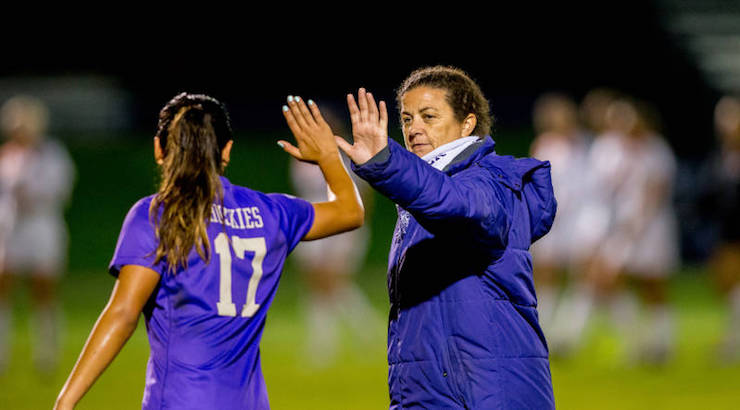Lesle Gallimore On Women Coaches at the Top Level
Lesle Gallimore — a strong influence in the game of women’s soccer — is currently in her 23rd season as head coach of women’s soccer at the University of Washington. Gallimore is the winningest coach in Washington history.
A longtime advocate for growing the role of women in soccer, Gallimore is a speaker at the 2017 Women in Soccer Symposium this January.
Soccer News: University of Washington head coach Lesle Gallimore is now in her 23rd season with the Huskies and she inspires greatness from her players. She has been a major force in the women’s the game for decades, having led Washington since 1994 — and has the longest tenure of any coach in the Pac-12. Gallimore’s encouragement, originality and ingenuity has innovated the game.
 Gallimore has coached Hope Solo, Tina Ellertson (Frimpong), Kate Deines and Veronica Perez.
Gallimore has coached Hope Solo, Tina Ellertson (Frimpong), Kate Deines and Veronica Perez.
Gallimore has also served as a member of the U23 U.S. Soccer Women’s National Team coaching staff. Previously, she served as head coach of the West Team for the U.S. Olympic Sports Festival in both 1994 and 1995 and as the head coach of the Region IV Olympic Development Program.
SoccerToday’s Diane Scavuzzo interviewed Gallimore on her inspirations for coaching, on the fight for credibility as a female coach and on the most infuriating inequities between female and male coaches.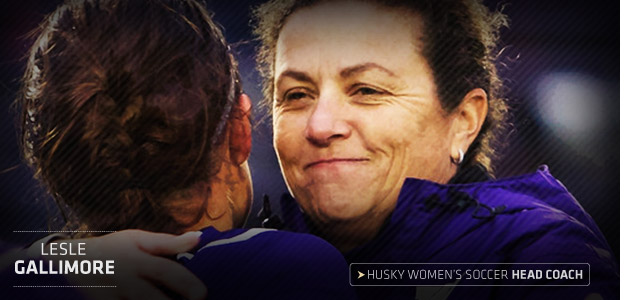
Diane Scavuzzo: When did you first start coaching?
Lesle Gallimore: I began coaching during college.
In a lot of ways I think I “coached” as a player on the field.
I began doing summer camps while in college and my coaching career formally began as soon as I graduated in 1986.
Diane Scavuzzo: What inspires you?
Lesle Gallimore: I was inspired by the effect I could have on teammates and players; the positive role I could play in their experience in soccer.
The game inspires me. The fact that it’s a team sport, that no game is every really the same ….
I am inspired that it’s so “player” oriented and, as a coach, I always try to remember this … I am inspired to teach the game, but to also make sure that my players know the game is “theirs” not mine.
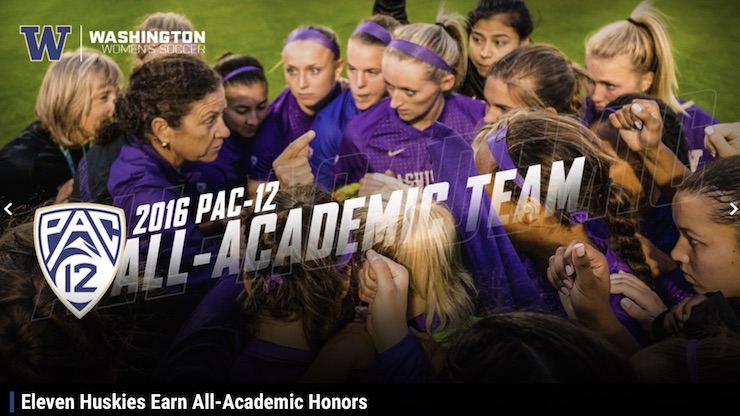
Diane Scavuzzo: What surprises people about you the most?
Lesle Gallimore: I’m not sure what about me surprises people … maybe that I’m nicer and kinder than they think? Ha.
Diane Scavuzzo: What is the accomplishment that you are most proud of?
Lesle Gallimore: I’m most proud of my longevity in the game. Of course there have been perceived “successes” throughout my career, but I think being in the game at a high level for as long as I have and contributing in a multitude of ways is what I am most proud of.
Diane Scavuzzo: What do you think is the most challenging or infuriating thing about working as a woman in soccer?
Lesle Gallimore: Challenging is having to really …
Fight for your credibility as a coach and, I’d say infuriating are the inequities between female and male coaches who coach women.
These inequalities include pay, the opportunities, etc.This is something that continues to be a challenge and one I’ll happily continue to help coaches fight.
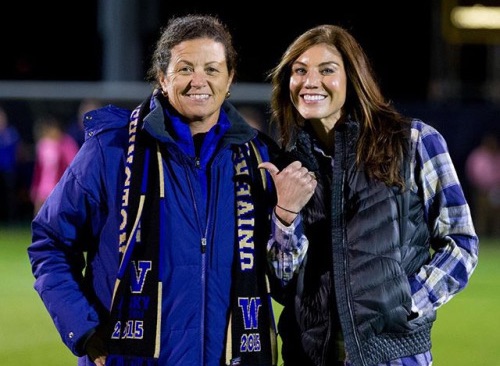
Diane Scavuzzo: Do female coaches face any special challenges? What are they?
Lesle Gallimore: I think we are challenged to prove ourselves “credible” and that we’re held to a much higher standard — from our experiences, to our pay, to the opportunities we get.
I think there are still more hurdles that female coaches experiences — more hurdles than male coaches see.
Diane Scavuzzo: Why do you think there are fewer female coaches in both youth and collegiate soccer?
Lesle Gallimore: It’s the million dollar question.
There was a time in the 90s when women’s collegiate soccer REALLY had a huge growth spurt and inexperience female coaches — many former players with no formal coaching education — got jobs and failed, and were fired immediately or run off and never came back.

I think also that coaching for women with families can be a difficult thing to balance and many women have chosen to step away from coaching to either find jobs that work more easily with family life or to be stay at home parents.
I also believe that all head coaches — and the bulk of them are male — could do a much better job of mentoring female assistant coaches — by giving them opportunities to begin with, and training them properly to succeed as a coach.
It is also important that we — as head coaches — inspire young female coaches to do the same in return when they get their chance.
Diane Scavuzzo: Why is it tough to be a female coach?
Lesle Gallimore: I don’t necessarily think it’s tough, I believe you have to perhaps “prove yourself” to players and others a little more.
I think being a great coach is tough — it goes so much beyond x’s and o’s and it also transcends gender.
I strive to be a great coach and that is tough, but it’s tough in a terrific way, I love the challenge.
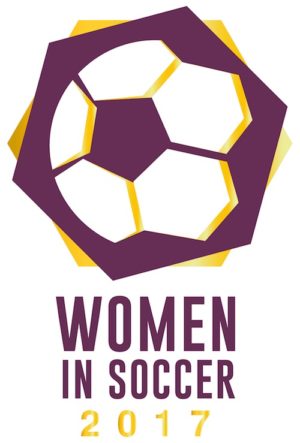 Diane Scavuzzo: What traits does a female coach need to survive and thrive?
Diane Scavuzzo: What traits does a female coach need to survive and thrive?
Lesle Gallimore: Confidence, credibility, knowledge, resilience, and willingness to continue to learn.
Diane Scavuzzo: How important is winning?
Lesle Gallimore: Winning is important in that it tends to give a lot of validation to doing things the right way.
It’s not everything because in sport — especially soccer — you can do A LOT right and still lose games; but I think over the long haul, if you can win consistently it validates a lot of your processes as a coach — not always, and not in ALL in environments, but in the environment I work, college soccer, winning has to be important.
For more information, see Lesle Gallimore’s bio on Women In Soccer.
Lesle Gallimore will be a speaker at the 2017 Women in Soccer Symposium on January 10th – the day before the NSCAA Convention kicks off.
Related Article: Women in Soccer 2017 Symposium

